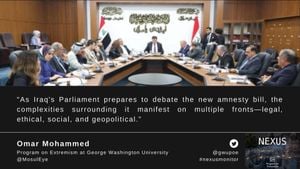Switzerland has emerged as a discreet yet pivotal player amid the Ukraine conflict, facilitating dialogue and negotiations aimed at fostering peace. The nation's commitment to peace has been evidenced by intensifying diplomatic efforts spearheaded by Thomas Greminger, director of the Geneva Centre for Security Policy. These discussions, which included representatives from Ukraine, Russia, and the United States, resulted in the development of the 'Ceasefire Toolkit,' intended to guide ceasefire negotiations.
According to Greminger, "The toolkit was developed over the past two years...in cooperation with leading international experts". This initiative reflects Switzerland's long-standing tradition of neutrality and diplomacy, alongside its capacity as host to various international negotiations. The informal meetings, known as Track-II diplomacy, allow political experts not formally representing their governments to engage freely and discuss complex issues without the pressure of direct governmental oversight.
These consultations took place over several months, culminating in key meetings reported as having occurred recently, particularly around February 2025. They have garnered attention for their focus on creating non-official avenues for dialogue. Greminger emphasized the importance of confidentiality, stating, "Confidentiality is critically important for successful operation within this format." The initiative aims to provide frameworks for discussions around issues like demilitarized zones and mechanisms to monitor ceasefire compliance.
Swiss President Karin Keller-Sutter echoed the nation’s solidarity with Ukraine, reinforcing the stance by proclaiming, "Switzerland will support Ukraine...a just and sustainable peace cannot be achieved without and beyond Ukraine." She outlined the government's financial commitments, including the allocation of approximately 1.5 billion Swiss francs ($1.67 billion) aimed at urban recovery and humanitarian aid, extending from now until 2028.
Adding to the discourse on Swiss support, the Swiss Army's head, Thomas Süssli, mentioned potential plans for peacekeeping troops. He announced, "Switzerland could send around 200 soldiers for peacekeeping missions on the Ukrainian-Russian border within the next nine to twelve months." This mission would be contingent upon strict adherence to Switzerland's neutrality, emphasizing the distinction between peacekeeping operations and interventions requiring the use of coercive force.
Highlighting this balancing act, Süssli noted, "We do not want Russia to be rewarded for aggression," underlining the careful diplomatic path Switzerland aims to tread amid rising tensions. The Swiss Armed Forces, already experienced through their involvement in international missions, are prepared to adapt to the requirements set forth by the United Nations should such peacekeeping missions be sanctioned.
Interestingly, Swiss efforts have not gone without scrutiny. The government’s position indicates it will not confiscate frozen Russian assets, maintaining both its diplomatic relations and its neutrality, which are central to its international identity. Although some political observers worry about Russia's potential attempts at destabilization, indicated by predictions of renewed conflict by 2027, Switzerland remains committed to providing humanitarian support and engaging diplomatically.
The international community is watching Switzerland's actions closely. With its upcoming presidency of the Organization for Security and Co-operation in Europe (OSCE) set for 2026, Keller-Sutter indicated the opportunity for Switzerland to contribute even more significantly to establishing peace and security frameworks across Europe.
Switzerland’s continued humanitarian efforts, its hosting of important dialogues between conflicting nations, and its proactive financial commitments position it as an influential mediator on the international stage. The discourse around these efforts reflects the complexity and urgency surrounding peace negotiations, underlining the necessity for sustained collaboration and engagement among nations for the sake of future stability.



